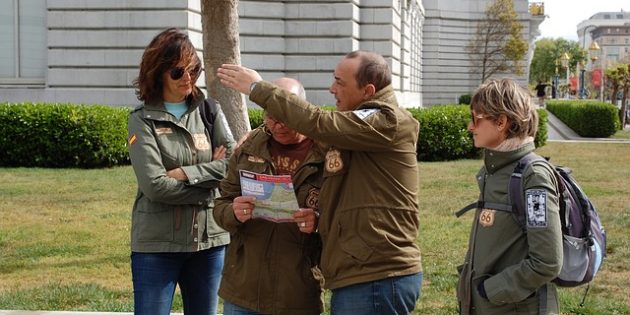As human beings, we are predisposed to do what is comfortable for us. In fact there is a part of our brain that hard wires in our routines and habits so we don’t have to think about doing them. That is a survival tactic to help conserve vital energy levels.
Which means we don’t like to think hard. There is a statistic I read somewhere that said 95% of the thoughts we have today will exactly the same tomorrow. As human beings we are creatures of habit, especially when it comes to our thinking.
So when it comes to learning a new language, we will lean on our native tongue as a reference point. It is like a safety net.
What ends up happening is we get an idea of the words we want to say in our head (in our mother tongue) and then try to translate them into our new language.
The challenge is being sophisticated in your own language.
Thinking in English Hinders Speaking In Spanish
You might want to ask someone for directions to the bus station.
In your head you’ll think “I want to say ‘Excuse me, can you please direct me to the bus station'”.
But you might only have the vocabulary for excuse me (because it was phrase 1 on track 1 of your language programme MP3 set) and the word for “bus”.
So the raw material you have is “Excuse me” and “Bus”.
“Hang on…! What about the other words I want to use?”
And so not being able to translate exactly what we want to say is usually the stumbling block… So we say nothing.
I came to this conclusion as I was walking to a dental hygienist appointment. On the walk, I thought I would use the time to listen to more Spanish instruction.
What was I listening to? It was Michel Thomas on CD1 of his speak Spanish audio programme. He was asking his two students for the Spanish translation of of a number of sentences.
I realised that I wanted to look for the literal translation of the words that he said – replacing each English word with a corresponding Spanish word.
Of course that is not how it works – Spanish is structured differently to English and so there is no one on one comparison. Which means you have to think about the language and learn to adapt.
So when faced with trying to translate what is in your head to what you want to say – there is a bit of confusion and frustration because it isn’t that simple. The easy thing to do is to return to simple words. In our example of looking for directions to the bus station we could resort to:
“Bus?” with the universally understood shrug of the shoulders with palms raised upwards.
In one word we have communicated what we want. But perhaps our ego wants us to be as fluent in Spanish as we are in our own language right from the start. And if you have a fixed mindset one of two things will happen:
- You will wait until you have more words and grammar under your belt before you say anything, becoming a perpetual student.
- You will assume that languages are not for you and will give up.
What It Will Take To Become Fluent?
But let’s just think about the components of fluency for a moment. I think that to be able to effectively communicate in another language you will probably have to develop skills in these areas:
– Vocabulary
– Verb conjugations
– Grammar
– Understanding what you hear
– Understanding what you read
– Saying what you mean
– Writing what you mean
Each of these need to be addressed and focused on for you to become fluent. You will need them all, but where do you start?
I suspect they won’t all come at once. You will have to get so far with one before needing to add in some of another to help make sense of the language.
The trouble is the easiest route (perhaps learning basic vocabulary) might feel comfortable in your own head but might initially fail under the scrutiny of an attempted conversation with a native speaker.
Alternatively, the harder route of just immersing yourself in your new language might seem too overwhelming at first. If you have a fixed mindset you might give up because you make a snap judgement that you can’t learn and so give upl.
I think the neuroscience of learning is something I want to explore in some detail. I liken it to riding my motorbike. When I started I struggled to control the bike through the re-distributed controls across all four limbs ( I was used to driving a car).
But now I can control my motorbike and ride it with ease – and at quite a high level too.
So today I sit and listen to some Spanish. It sounds like gobbledygook… eventually I will understand it like I always have…what will have changed?
It is my brain. That mass of neurons will have restructured itself because of the stimulation that I will have given it. It will have morphed from a structure that can’t understand Spanish to one that can.
At least that’s what I think.
But all this insight is a complete waste of time if I don’t apply myself to some serious and considered study. Just listening to the audios and getting a few questions right in the moment won’t cut it. I have to push myself.
But the bottom line is this – I will have to stop thinking in English if I want to speak Spanish.
Easier said than done I think!








Leave A Response